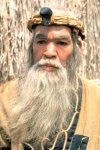gotogo
Jedi Master
Thank you for you input, Blomlast!
I was exploring my speculating point:

So "Epistasis" and "population bottleneck (or genetic bottleneck)" gave me great hints! :)
I was exploring my speculating point:
yesterday night, questioning WHY "the early shamans of East Asia" descendant does not have appearance of Kantek anymore while "the circle-people of Europe" descendant kept trace of Kantek in their appearance? I felt there are some "manipulative intentions" behind.3) And the result of this merge the appearance of "out of Kantek" is totally ERASED.

Q: (L) Okay. So the next question is: The putative Nostratic speakers in East Asia include the Asians that I think were the original shamans which I've discussed in Secret History and elsewhere, Altaic speakers in particular. So if this is the case, and if Nostratic as a linguistic group can be correlated with an original population from Kantek, does that mean that both the early shamans of East Asia and the circle-people of Europe (with the pyramid people further south) have their origins on Kantek?
A: Yes.
So "Epistasis" and "population bottleneck (or genetic bottleneck)" gave me great hints! :)





